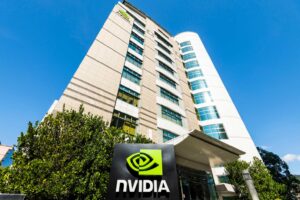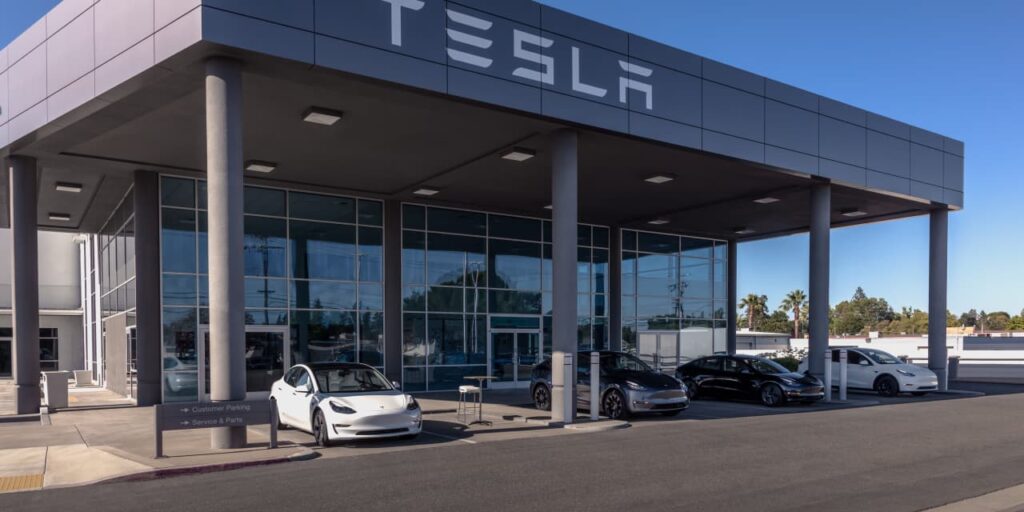Tesla
stock was falling Monday, heading for a downbeat start to the week. Profit-taking in electric-vehicle peers as well as production data from China have investors concerned. Fears about first-quarter delivery volumes appear to be creeping in, too.
Tesla
stock was down 7.7% at $187.08 in Monday trading, while the
S&P 500
was flat and the
Nasdaq Composite
fell 0.2%.
China seems to deserve some of the blame. Monday morning, several news outlets reported that Tesla sold about 60,400 cars from its plant in Shanghai in February. The reports cite China Passenger Car Association data that are released early each month.
That’s down about 19% from the same time a year ago. In 2024, however, the Chinese Lunar New Year holiday fell in February; last year it fell in January. Over January and February, Tesla sold 132,000 cars from its plant in Shanghai, down about 6% from 2023.
BYD
reported February deliveries this past week. Sales of all-battery EVs in January and February dropped about 1% from a year earlier. BYD had a relatively stronger January and a relatively weaker February.
For the overall industry, sales of battery EVs and plug-in hybrids are expected to be about 450,000 units in February, down about 9% from a year ago.
January and February are two of the weakest months of the year for new car sales, making it difficult to draw conclusions regarding how this year turns out. Citi analyst Jeff Chung projects Chinese battery-EV sales will grow about 16% from the prior year, coming in at about 7 million units for 2024.
Still, the recent numbers have investors worried about Tesla’s first-quarter deliveries.
Future Fund Active ETF
co-founder Gary Black pointed out that “Troy Tesike” recently cut his first-quarter delivery estimate to 450,000 units from 465,000 units, citing weaker-than-expected Chinese sales and constrained production of the updated Model 3 at Tesla’s Fremont factory.
Troy has more than 135,000 Twitter followers and his numbers are referenced by Wall Street analysts.
Wall Street currently is projecting about 478,000 units. A year ago, Tesla shipped about 423,000 vehicles.
Along with slowing sales growth, global EV competition is still fierce. Tesla and others have cut prices in China in 2024. On Friday, Tesla started offering Chinese car buyers an insurance subsidy as an additional incentive, according to a Chinese-language post on the company’s Weibo social media account. BYD also recently launched the latest version of its top-selling Yuan Plus crossover with a price 11.8% lower than the model it is replacing, according to Reuters citing a
Weibo
post.
Tesla is also offering U.S. buyers some additional incentives such as 5,000 miles of free Supercharging on select trade-ins through the end of March.
Tesla is both the auto maker and the dealer making it more difficult to compare Tesla’s pricing actions and incentives to others. Industry data provider Cox Automotive says U.S. auto industry incentives totaled about 5.7% of the average transaction price in January, up from 2.8% a year ago. That works out to about $2,700 off at the dealer, up from about $1,400 a year ago.
Elsewhere in the sector, investors in rival
Li Auto
may have cashed in on the big gains last week by taking profits. It ended Monday down 10.7% on the Hong Kong exchange, and its U.S.-traded American depositary receipts were falling 13.6% in the premarket. Coming into Monday trading, ADRs gained about 55% over the past month, and about 25% this past week, reacting positively to better-than-expected earnings.
For the past month into Monday trading, Tesla stock was up about 12%, better than the 4% gain of the Nasdaq over the same span.
Another reason for Li Auto’s Monday share drop could be consumer disappointment over MEGA, its first full-electric model, which was launched on Friday, according to The Wall Street Journal.
In other news, court papers filed just before the weekend showed the lawyers who won the court case to void the large pay package for Tesla CEO Elon Musk requested the presiding judge grant them $5.6 billion in Tesla stock to cover their legal fees, MarketWatch reported.
Shares of other Tesla peers were also moving.
NIO
ADRs were down 8.1% in late trading,
Lucid Group
stock was down 6.5%,
Rivian Automotive
shares were down 4.3%, and shares of
Ford Motor
shares rose 3.3%.
General Motors
stock was flat.
Tesla stock is well off its 52-week high of $299.29, set last summer.
Trading volume of 82.2 million shares at Friday’s close remained 27.93 million below its 65-day average volume of 110.13 million.
Write to Rupert Steiner at rupert.steiner@barrons.com
Read the full article here












